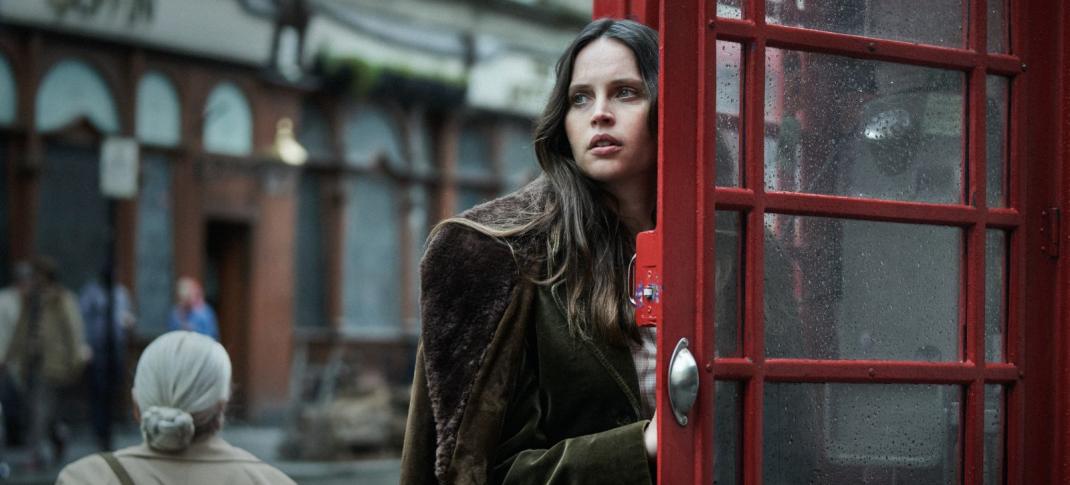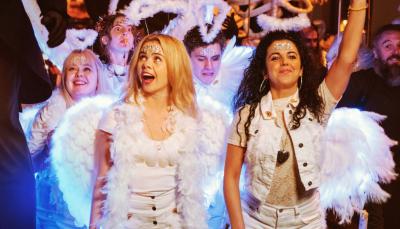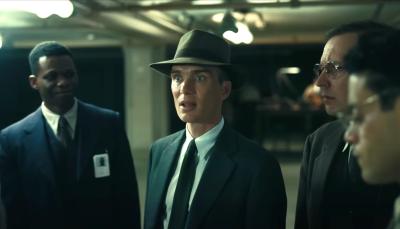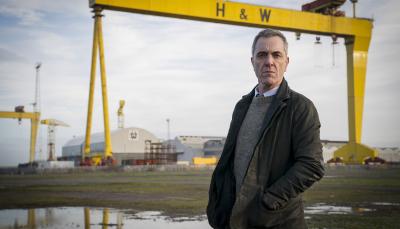The Irish Troubles Film 'Dead Shot' Can't Quite Pull the Trigger

Felicity Jones as Catherine in 'Dead Shot'
The Highland Midgie/Mark Mainz
Dead Shot, which debuted on Sky TV in May 2023 and played at the 2023 Edinburgh Film Festival, sits in a weird nether zone of British media made about the Irish Troubles, unafraid to show the complicated morality and brutality of the conflict but hampered by a vague centrism that might have been fixed if more Irish voices were present behind the camera. For those who feel lost watching Derry Girls, the “Northern Ireland conflict” lasted about thirty years, but its origins go back decades, if not centuries. British military presence in Northern Ireland was designed to quell momentum built primarily by the nationalist paramilitary IRA (Irish Republican Army). However, their occupation only increased tensions, and violence lasted throughout the period.
Set in 1975, Dead Shot takes place before the tenure of Conservative prime minister Margaret Thatcher but after IRA violence had severely escalated in the decade thus far. In the film, Michael O’Hara (Merlin’s Colin Morgan) rejoins the paramilitary group he retired from to stage a bombing in London to hunt down the British soldier who shot his unarmed, pregnant wife. As he evades the military, he finds his way back to Keenan, an IRA leader working at a school who will only offer help if Michael will help move explosives around London to be used in future attacks – Michael has no choice but to agree.
The soldier who killed Michael’s wife, Tempest (Aml Ameen), has escaped justice for killing Carol by joining a secret police force to clamp down on IRA members in London and has returned to a singer he loves, Ruth (Sophia Brown). He’s fixated on finding Michael and bringing him to justice after his public and costly mistake in the field, drawing the two men together for a destined showdown.
Dead Shot takes inspiration from the historical account of the Balcombe Street siege, The Road to Balcombe Street, by Steven P. Moysey (there’s very little writing on the book online, but some scant Goodreads reviews call the book “amateur” and “deferential to authority”). Even though English directors Tom and Charles Guard are credited as writers, they worked from an original script by Irish writer Ronan Bennett, the Belfast-born writer behind series such as Top Boy and Gunpowder. If Dead Shot leaves you with anything, it’s a longing to see what Bennett’s draft looked like – he’s a far more experienced writer than the Guard brothers, and his perspective on the Troubles deserves to be more than a jumping-off point.
(A historical side note of interest: as an Irish teen, Bennett was arrested over the killing of a police officer in an IRA robbery, he was released after the arrest was deemed unsafe.)
What the Guard brothers contribute to Dead Shot is a distinct and uncommon visual style, even if it feels only halfway realized. From the opening minutes, where we see headlights veer through murky, winding Irish country roads, it’s clear the Guards are interested in mood, creating an atmosphere that apes the blurred lines and questionable moral prerogatives of ’70s thrillers. It’s there in the blunt, impactful camera blocking and editing, quick zoom-ins, and slow pull-outs. The color palette is grey and ugly, but so was London back in the day! (Dead Shot’s London is actually Scotland, mainly Glasgow and sometimes Edinburgh. Yes, they do look like that.)
The problem is that Dead Shot’s visual choices always feel like choices and reeks of artificial calculation. Multiple shots have been altered in post-production as if the filmmakers thought the visual style wasn’t evocative enough and needed to stress it more – it’s constantly distracting. The lack of visual polish doesn’t just apply to the old-fashioned techniques; too often, scenes are shot in a nauseating close-up, intended to give the film a heightened claustrophobic feel and keep the audience emotionally removed. A climactic chase from Paddington station features lots of sharp camerawork, but it struggles to edit together into a propulsive, uniform momentum.
The visuals mirror the narrative; Dead Shot hops from plot point to plot point without ever gripping them dramatically or diving into their emotional fallout. At one point, Tempest tries to convince Ruth to leave London with him, and her retort of “You killed a pregnant woman!” is treated more like a narrative obstacle rather than something for the character to truly process. Characters like Catherine (Felicity Jones), an IRA go-between in London, feel incidental to the narrative, designed with the star’s reduced availability foremost in mind. (Jones is also married to Charles Guard.)
A split narrative à la Infernal Affairs or Heat is nothing new in a crime film, but in something so grounded in a real, complex, and heavily revised history, questions of purpose and intent arise. What are we actually trying to show by showing two tormented perspectives on both sides of the conflict? What do we gain by equating the viciousness and abuses of both Irish and British individuals? Dead Shot doesn’t show enough bite in grappling with these questions.
There’s a world where this could work as something more stark and elemental – a novella or atmospheric arthouse piece (one of the closing shots reminds us of Alan Clarke’s seminal short film Elephant). As it stands, Dead Shot lacks too much to be worth commendation – strange when it’s drawn from a period in history rich in complicated politics and humanity.
Dead Shot opens in limited release in the U.S. on Friday, August 18, 2023, and will be available through most video-on-demand rentals.





